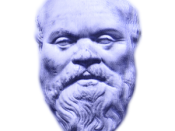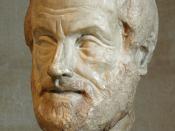A Turn Inward
Aristotelian philosophy, some two thousand three hundred years old, is perhaps one of the most influential philosophies in history. After being preserved by Arab scholars during the fall of Rome, the teachings of Aristotle were found by Christians during the dark ages. His works, including Nichomachean Ethics, were of great influence to many Christian philosophers during medieval times, but soon philosophies began to shift, marking the conception of the Enlightenment. Philosophy took a drastic shift from predominantly substantive reason to procedural views, markedly seen in works by philosophers St. Augustine, Rene Descartes, and quite notably Immanuel Kant. By comparing the views shared by Aristotle in Nichomachean Ethics, and Kant's Groundwork of the Metaphysics of Morals it is possible to better understand the shift from substantive to procedural reasoning. Although Aristotelian philosophy and logic shares some common ground with the writings of Kant, Groundwork of the Metaphysics of Morals marks a shift from society and substantive thinking toward the self and procedural reason.
Kant believes that each living organism serves a purpose. For example, the highest purpose of a honey bee is undoubtedly to produce honey. Much in the same sense, Kant feels that because humans alone are given the ability to reason that the highest purpose of humanity is to use reason. (Groundwork, Ch. 1, Ln. 50-80) Aristotle would agree with this statement but uses a different logic. Aristotle sees an intrinsic good within every action, as well a hierarchy of goods and actions. Using the logic that any action partaken for the purpose of some greater cause is secondary to the greater cause, Aristotle reasons that for humans, the act of reasoning is of the greatest "good" because all other actions exist only to maintain the ability to reason. (NE, Bk.1 Pg. 1-2)...



Good approach
Aristotle and Kant philosophy rise issues that are the core of today philosophy.
5 out of 5 people found this comment useful.